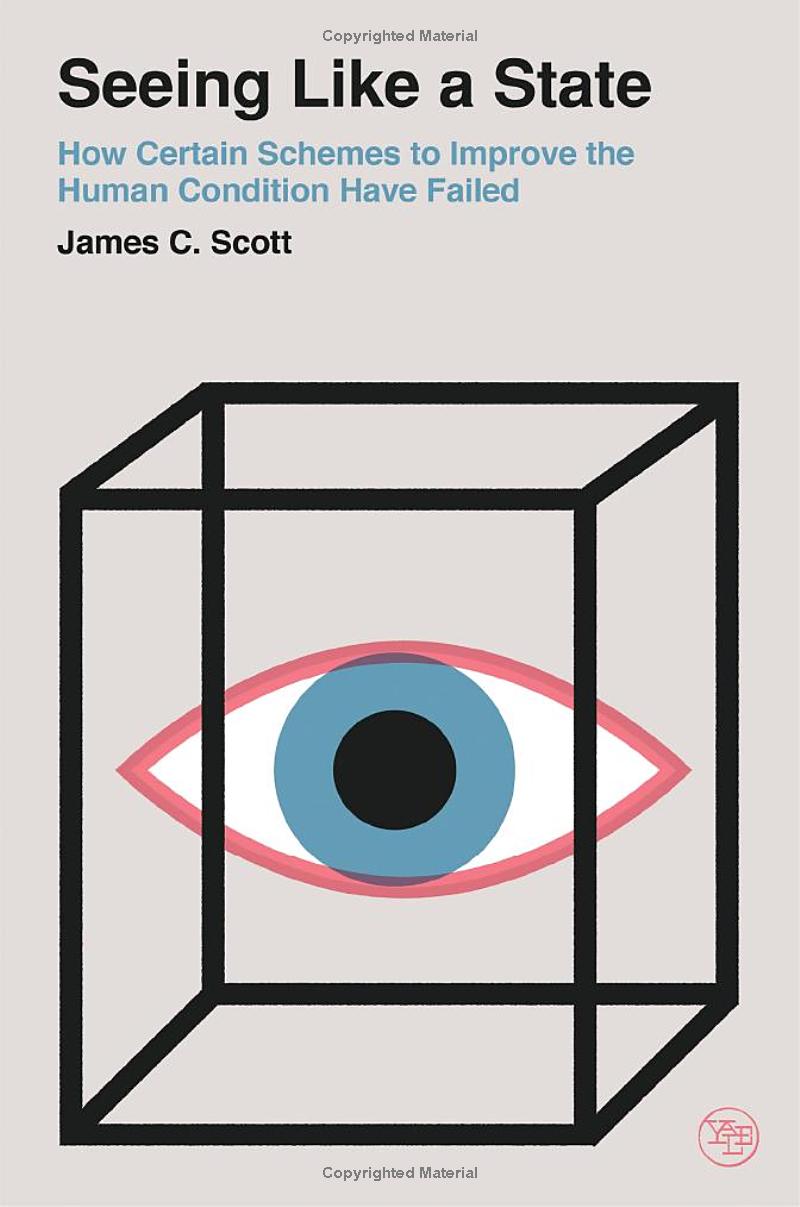
Seeing Like a State
James C. Scott
Certain forms of knowledge and control require a narrowing of vision. The great advantage of such tunnel vision is that it brings into sharp focus certain limited aspects of an otherwise far more complex and unwieldy reality.
There is, then, no single, all-purpose, correct answer to a question implying measurement unless we specify the relevant local concerns that give rise to the question. Particular customs of measurement are thus situationally, temporally, and geographically bound.
The builders of the modern nation-state do not merely describe, observe, and map; they strive to shape a people and landscape that will fit their techniques of observations. [...] The more static, standardized, and uniform a population or social space is, the more legible it is, and the more amendable it is to the techniques of state officials. [...] Categories that may have begun as the artificial inventions of cadastral surveyors, census takers, judges, or police officers can end by becoming categories that organize people's daily experience precisely because they are embedded in state-created institutions that structure that experience. [...] The categories used by the state agents are not merely means to make their environment legible; they are an authoritative tune to which most of the population must dance.
How a city develops is something like how a language evolves. A language is the joint historical creation of millions of speakers. [...] Like planned cities, planned languages are indeed possible. Esperanto is one example; technical and scientific languages are another, and they are quite precise and powerful means of expression within the limited purposes for which they were designed. But language per se is not for only one or two purposes. It is a general tool that can be bent to countless ends by virtue of its adaptability and flexibility.
The first flaw is the presumption that planners can safely make most of the predictions about the future that their schemes require.
One of the major purposes of state simplifications, collectivization, assembly lines, plantations, and planned communities alike is to strip down reality to the bare bones so that the rules will in fact explain more of the situation and provide a better guide to behaviour. To the extent that this simplification can be imposed, those who make the rules can actually supply crucial guidance and instruction. This, at any rate, is what I take to be the inner logic of social, economic, and productive de-skilling. If the environment can be simplified down to the point where the rules do explain a great deal, those who formulate the rules and techniques have also greatly expanded their power.
Practice has long preceded theory.
Why are the rules of thumb that can be derived from any skilled craft still woefully inadequate to its practice? Artists or cooks, Michael Oakeshott has noted, may in fact write about their art and try to boil it down to technical knowledge, but what they write represents not much of what they know but rather only that small part of their knowledge that can be reduced to exposition. Knowing a craft’s shorthand rules is a very long way from its accomplished performance.
Knowing how and when to apply the rules of thumb in a concrete situation is the essence of mētis. The subtleties of application are important precisely because mētis is most valuable in settings that are mutable, indeterminant (some facts are unknown), and particular.
The epistemic alternative to mētis is far slower, more laborious, more capital intensive, and not always decisive. When rapid judgments of high (not perfect) accuracy are called for, when it is important to interpret early signs that things are going well or poorly, then there is no substitute for mētis. In the case of the experienced doctor, in fact, it is mētis that informs a decision about whether tests are needed and, if so, which tests.
A recurrent theme of Western philosophy and science, including social science, has been the attempt to reformulate systems of knowledge in order to bracket uncertainty and thereby permit the kind of logical deductive rigor possessed by Euclidean geometry.
The formal order encoded in social-engineering designs inevitably leaves out elements that are essential to their actual functioning. If the factory were forced to operate only within the confines of the roles and functions specified in the simplified design, it would quickly grind to a halt.
To any planned, built, or legislated form of social life, one may apply a comparable test: to what degree does it promise to enhance the skills, knowledge, and responsibility of those who are a part of it? On narrower institutional grounds, the question would be how deeply that form is marked by the values and experience of those who compose it. The purpose in each case would be to distinguish “canned” situations that permit little or no modification from situations largely open to the development and application of mētis.
That most characteristic of human institutions, language, is the best model: a structure of meaning and continuity that is never still and ever open to the improvisations of all its speakers